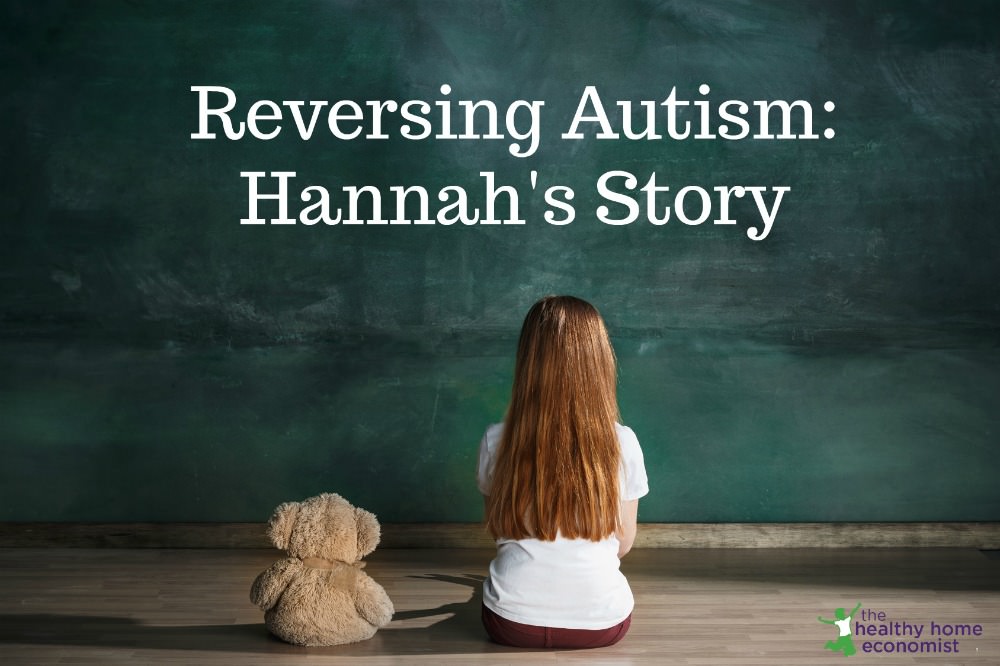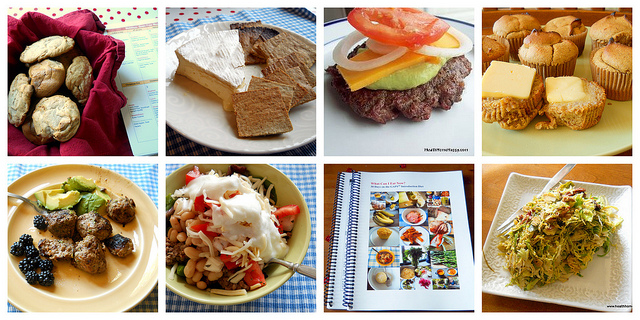How the GAPS Diet reversed symptoms of autism in just two years in a young girl who is no longer on the spectrum and living a normal childhood.
I knew my daughter Hannah had autism when she was only 12 months old although she wasn’t professionally diagnosed until age 4.
Now at 6 years old, after being on the GAPS Diet for 2 1/2 years, Hannah no longer carries an autism diagnosis and the progress she has made has been nothing short of life changing.
What’s more, Hannah has successfully transitioned off of GAPS in recent months and is now eating a normal traditional diet which includes grains and starches – with no regression or recurrence of symptoms!
For those of you new to GAPS, it stands for Gut and Psychology Syndrome. GAPS is a temporary diet that was designed by Dr. Natasha Campbell-McBride MD to reverse autism in her own son. GAPS works to heal the gut lining, rebalance intestinal flora, and help with nutrient absorption.
In a nutshell, the GAPS Diet cuts out grains, sugar, and starch, and adds in foods rich in probiotics, healthy fats, and amino acids needed to heal and seal the gut wall. Once the gut lining is healed, many chronic health problems magically go away- things from autoimmune diseases to behavior problems to eczema.
Yes, even autism!
Hannah’s Story of Reversing Autism
I had been keeping an eye on Hannah’s development from 4 months old when she wasn’t making eye contact, rolling over, or interested in anything other than nursing, I knew something was up, but it was right near her 1st birthday that I looked up the diagnostic criteria for autism, and realized that yes, she most likely did qualify as autistic, though most professionals won’t diagnose it until 3 years. It wasn’t until she was 4 that she received a formal diagnosis from a professional, but I knew I needed to start intervention as soon as possible in order to give her the greatest chance for a full recovery.
I started by keeping her on a Weston A. Price Traditional Diet of all organic, nutrient dense foods as she was weaning, but when I didn’t see improvement with that we tried the gluten free casein free diet, which helped her ability to learn temporarily. After awhile, however, she lapsed back into ‘autism land’.
As a desperate young mom with an autistic toddler, and now her infant baby brother, I continued to search for ways to help my child. Googling ‘what to do when the gluten free casein free diet stops working autism’ brought up the GAPS Diet – this was 2009 when GAPS was just beginning to be known across the internet.
It took me a few months to work up the motivation to place my small child on such a restrictive diet, but the waking up every 2 hours all night every night, her not making progress in speech or occupational therapy because she was unable to learn, and wanting so desperately to improve her quality of life pushed me to give GAPS a try. Just after Hannah’s 3rd birthday I said we would only try GAPS for 30 days. And I tried it with her, to make sure I felt okay on such a different diet than typical Americans eat.

Starting GAPS
We started GAPS with the intro diet in November 2009. I saw such great progress with her (and myself- GAPS cleared up a dairy allergy that I’d had since childhood, in just 6 weeks of the intro diet!) that I committed to keep going.
She was able to learn again, and seemed to be starved for GAPS food; she was actually eating more than I was as a lactating mother!
Continuing GAPS as it was needed
We continued GAPS for 2-1/2 years, working to heal the gut lining. Hannah’s digestion improved, and she started eating less after having been on the diet for a few weeks- her body was so starved for nutrients at first that she would eat everything in sight, but slowed back down to a typical toddler amount after a few weeks on GAPS.
The most exciting part of Hannah’s improvement on GAPS was that she was once again able to learn. She started making progress in speech, occupational, and physical therapies. She took an interest in other children, was sleeping well at night, and was happier during the day. GAPS gave her quality of life so much improvement, that there was no question that we had to continue the diet as long as it helped her.
As we continued, I got better at cooking GAPS food. In the beginning we ate vegetable soup, cooked chicken, hamburgers, and scrambled eggs nearly every day. GAPS forced me to be more creative with the allowed GAPS food, and I was able to expand to very enjoyable meals!
Hannah knew her diet was different, but she was content with her food. Other parents would look on at me jealously as she gobbled up eggs, meat, fruit, and veggies. The diet took effort to continue with, but once we had been on it about 6 months it just became routine.
Transitioning off the GAPS diet after 2 years
GAPS is intended to be a temporary diet, so after Hannah had been on it and doing well for 2 years, I started trying some foods that weren’t GAPS legal about once a month. We started with potatoes, popcorn, and whole raw milk and she did well. We continued introducing new non-GAPS foods and watched carefully for any reactions (wheat was the last thing we introduced). If her gut wasn’t healed enough to tolerate a food I saw reactions in the form of skin rashes, night terrors, or loss of eye contact- every person’s reactions would be different though.
In June we traveled to California for my little brother’s wedding. She had been transitioning off GAPS for 6 months by then, so I decided to just let go and see if she could eat what everyone else was eating. She did great! No reactions to the food at all. We were officially and successfully done with our GAPS and food allergy journey!
No longer Autistic!
Though Hannah still has some learning disabilities (I believe this is from the long time that her brain was bombarded with toxins pre-GAPS, and we’re trying other therapies to continue to help with this), she just was tested this fall and no longer meets the criteria needed for an autism diagnosis.
She has benefited so much from the GAPS diet, and has come so far from the 12 month old who would just fuss or stare off into space all day. She is toilet trained, loves interacting with peers, talks, learns new things, makes great eye contact, and is getting much better at accepting changes to her routine.
We still eat mostly GAPS at home, since it is such a nutrient dense diet that our whole family thrives on. But being off GAPS means that I don’t have to stress when we’re out and we can just eat what everyone else is eating.
The GAPS diet has been amazing for our family, I am so thankful that Dr. Natasha Campbell-McBride wrote the GAPS book in time to help Hannah. I’m also thankful it’s not a diet we have to be on for life, but it was so worth it to stick with it for the couple years we needed to be on it.
About Cara
 I’m Cara, and I write at Health, Home, and Happiness. Because I was so overwhelmed when starting the GAPS Diet, I put together some resources to help others who want to do GAPS.
I’m Cara, and I write at Health, Home, and Happiness. Because I was so overwhelmed when starting the GAPS Diet, I put together some resources to help others who want to do GAPS.
I have GAPS friendly meal plans (full GAPS), a book that helps you get through the more strict Introduction Diet, and even a guide to help you stock your freezer with GAPS friendly foods.
More Information on the GAPS Diet
GAPS Diet: Heal Your Autoimmune Disease Now
Overwhelmed by the GAPS Diet? Help Has Arrived
How to Speed Healing and Shorten Time on the GAPS Diet
The Five Most Common GAPS Diet Mistakes
GAPS Diet Heals Ulcerative Colitis
5 Steps to Healing IBS Naturally
FPIES: Resolving the “Other” Food Allergy
Chronic Stomach Pain and Bloating Gone!








I do not believe that GAPS diet can permanently reverse autism. I believe the autism is still there and just under better control by diet change. Just like drugs are effective diet changes effective is effective in neurotypicals. Hannah being toilet trained has nothing to do not being autistic anymore. People get toilet trained as they grow up and her being 6 years old makes sense that she would be toilet trained. I believe that shows show strong symptoms of autism again but autistic symptoms do you change as people get older. Especially that she’s gotten off the gaps diet makes me think that it’s not possible for her to not have symptoms that she would have had if she was never on it.
I wrote on comment 4 days ago and it has not been answered yet. I am just wondering if it got lost.
I just ordered your intro book and am super excited to start the diet with my son who has autism. I have a few questions:
!) The recipes you suggest for each day…do I have to make them all or just the ones I want?
2) Can I do each day twice to cut down on the cooking?
3) When you talk about stock are you talking about the chicken stock that we make in the beginning?
4) This is for breakfast, lunch and dinner…right?
Thanks for your help. I will keep you updated on how things are going.
i get really frustrated when I hear people say “autism is genetic, you can’t change it” . Yes, autism (in most cases, other than vaccine injury) is genetic (and even in the case of vaccine injury could be genetic predisposition). Ever heard about epigenetics people? If not, start reading before you start commenting. I have a daughter with Asoergers, and a genetic disorder called Kabuki syndrome. Her life has been significantly improved through the GSOs diet. And to who say “no scientific studies so it doesn’t count”. Well poo poo to you. For years people said “no scientific studies to prove cigarettes Re linked to lung cancer”. Scientific studies require money. Big pharmas have money, people working with basic nutrition don’t. I have worked as a statistical researcher for 20 years, so I u der stand all about empirical evidence. But anecdotal evidence is worth looking at too. Get enough anecdotal evidence over time, and people might be interested din a scientific study..me, personally, I wasn’t willing to wait for the “experimental research” evidence to become available..so I did a sh8tload of my own research, and determined there was enough anecdotal evidence (with scientific theory to back it up) to make GAos worth trying. Thank god I did.
Hi Kath,
I have recently been introduced to the GAPS’s diet by my boyfriend who is an EXTREME researcher and delves very deeply into his research to back up his research and so forth. He has recently started the gaps diet for a severe stomach condition that was caused by antibiotics and has struggled very badly with it. He is currently reading the book which I can’t wait to get my hands on as I have seen the chapters regarding gaps and autism. It is amazing what nutrition can do for yourself and your children’s health and it should certainly be the first type of antibiotic your doctors prescribe! I have recently posted a ‘controversial’ article on LinkedIn about vaccinations doing more damage then good and the same response regarding ‘anecdotal’ basis of the article from commenters was a common theme. Like you said, this information is out there for a reason and if it opposes the general view, which seems to be based on only what the pharmaceutical companies are telling them, does that mean ‘anecdotal’ articles and ‘research’ should be dismissed! Absolutely not! The whole argument that there is no ‘scientific proof’ that vaccinations are linked to autism is ridiculous – there was scientific proof which got thrown out by – THE PHARACEUTICAL companies who want you vaccinate so they earn all there pennies. People who claim there is no ‘scientific’ proof vaccinations are dangerous – c’mon people do your research. Just because its not on the front of the newspaper does not mean that ‘proof’ isn’t out there! It is – even if it is in ‘anecdotal’ format!
Loved your comment Kath!
I think that woman all over the world are learning to listen to their own intuition and are choosing to do what they feel is right. I did not vaccinate my daughter 28 years ago as at the time the connection between the MMR and autism had been established. I knew of one little girl whose bowel was so damaged that she could not tolerate any food and had part of her bowel removed. The children in my village who had been vaccinated all succumbed to the measles virus and my daughter who played with them and who had been encouraged to go to their houses did not get the measles. Although there has been in general a decrease in acute episodes such as measles and chicken pox, these have been replaces by chronic conditions such as autism, MS and juvenile arthritis. I made sure that my daughter stayed healthy by proper diet, exercise, fresh air and sunshine.
My son was non verbal until the age of 3 1/2. I started him on WAPF diet and it alone helped for us… He is 8 now, still unique, but very social and verbal and smart! I swear Fermented Cod Liver Oil/High Vitamin Butter Oil helped TREMENDOUSLY… among other things 🙂
Could you let me know the brand of the cod liver oil and the vitamin butter oil You got for your son.
I’ll add that we are treating my son’s emotional and behavioral problems with GAPS, very successfully. I am also doing it, and in just 3 months I felt like I had my life back after 15 years of a debilitating autoimmune condition. GAPS is awesome!
Learning disabilities do not equal autism, Karina.
“Hannah still has some learning disabilities”
So, she’s not cured.
I have only ever heard GOOD things with GAPS. Not one negative….amazing! If more people tried GAPS it could possibly be the end of BIG pharma in my opinion.
I’m curious to know if they cure the autism with the GAPS diet, will the child be autistic again of they stop the diet?